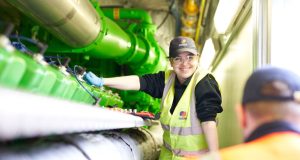Q: What was you first job in the FM sector?
Facilities Manager for Doncaster Primary Care Trust.
Q: What made you choose FM as a career?
I didn’t! It chose me really. I had been working in the NHS for a number of years mainly in Governance and Performance when an opportunity came up for a six month secondment as Facilities Manager for the first tranche of PFI health centres in the area, it sounded interesting so I applied and was successful. Six months soon turned into years. I quickly realised that no two days are the same and I was hooked!
Q: How did you progress through the profession to your current role?
Hard work, a questioning mind and determination! I stayed in the NHS for a number of years and then government restructures abolished primary care trusts and premises management was centralised to NHS Property Services.
I came across an opportunity to move into a small local business to work as Facilities Director and took the plunge, unfortunately the company didn’t survive, and I found myself facing a situation of unemployment. A mentor at the time told me that if I didn’t try to continue in the commercial sector by setting up a business, I would kick myself in years to come and seven years later we are still growing and I’m still learning.
Q: Do you have any qualifications or training in FM and related areas such as health and safety? And how have you benefited from them?
I have a NEBOSH qualification and took a BIFM course in understanding facilities management in my early career.
Q: What is your greatest contribution to the FM sector, or your current role?
I’m Vice President of Doncaster Chamber of Commerce and I hope that this reinforces the message that women can succeed and contribute too in a typically male dominated environment.
Q: What’s changed most since you started in FM?
The number of women has definitely increased but it still feels like a ‘men in grey suit’ industry, flexible working patterns has significantly helped but there is still more we can do to attract women into the industry at all levels.
Q: What personal qualities do you think are most needed for a successful career in FM?
Communication skills are key, you have to be able to listen as much as converse in the tone of your customers and colleagues. You also need to have passion to want to make a difference, the FM business is about delivering that first-class service that lets your clients succeed in their own.
Q: If you could do one thing differently in your career in FM, what would it be?
Start earlier! I’ve enjoyed working in the industry I think there are probably experiences I have missed out that would make me a stronger professional than I am today.
Q: What would make the biggest difference to the FM sector? And how could that be achieved?
Promotion of the career opportunities available in the FM industry.
Careers advice is still typically centered around academic pathways and we, as businesses in Doncaster, have the chance to work closely with primary and secondary schools to share our career choices, this needs to be replicated nationwide.
We have a duty to act as ambassadors and to develop our industry professionals of the future.
Q: Are you a member of any FM association or body and if so what benefits do you think they provide?
No, I’m not a member but I do think that professional bodies can offer a lot of support.
Q: What advice would you give to young people coming into the profession now?
Listen and learn, there are fantastic learning opportunities around now from apprenticeships and degrees, but the knowledge gained from peers is invaluable.
Q: What are your long-term goals for the next seven to ten years?
This is a great question – and the honest answer is we haven’t set the plan that far in front, I would like to think that by year 10 I will have a successor in place so that I can focus more on other projects but then again 10 years ago I still expected to be working in the NHS!
Q: What do you predict could be the main changes to the FM sector over the next few years?
Technology will have a huge impact on the way we work, from smart building data to service delivery workflow, we are all striving to move away from paper-based systems.
Skills will also be huge and no one can predict the impact that Brexit will have on our workforce.
Q: What are the greatest challenges of working in FM?
Finding good people – there is definitely a skills shortage, across all industries but particularly engineering staff, this will be one of our biggest challenges to growth in FM of the future.
The cost v quality debate too, for some sectors it is still incredibly hard to building the loyalty as increased austerity takes over.
Q: What do you enjoy most about working in FM?
Learning about our client’s businesses and how our services impacts positively on them.




